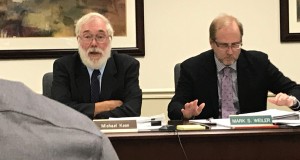From an Article by Ken Ward, Jr., Charleston Gazette-Mail, September 18, 2017
Photo: Air Quality Board Chairman Michael Koon (left) and board lawyer Mark Weiler announce the board’s ruling Monday on an appeal of a permit for a US Methanol plant that is under construction in Institute, WV.
Members of a state board on Monday refused to hear a permit appeal from a citizen group that is concerned that potential fires, explosions or other accidents at the US Methanol plant under construction in Institute could pose health and safety risks for area residents.
The West Virginia Air Quality Board granted the Department of Environmental Protection’s motion to dismiss an appeal that the group People Concerned About Chemical Safety filed, agreeing with the DEP that the issues raised were beyond the scope of the state agency’s job. The decision means the board won’t hold a full hearing with testimony about the citizen group concerns.
In arguing against the appeal being dismissed, Bill DePaulo, attorney for the People Concerned organization, urged the board members to make clear what ruling for the DEP’s motion would be saying to the public.
“Win or lose, I’d just like a clear ruling,” DePaulo told board members. “Do it in big, bold letters: ‘We do not consider the human health and safety in issuing this permit.’ ”
US Methanol hopes to start production in mid-2018 at the plant that would convert natural gas to methanol, a common industrial feedstock. The facility, located at the Institute property now operated by Dow Chemical, would use parts from a deconstructed plant in Brazil.
A variety of political leaders, including Gov. Jim Justice and Kanawha County Commission President Kent Carper praised the project, which promises 60 permanent jobs, during a groundbreaking ceremony two weeks ago. Construction had already begun, despite the pending challenge to the project’s air pollution permit.
In the permit appeal filed in April, People Concerned argued that the DEP’s Division of Air Quality did not examine the potential consequences for the surrounding community of a spill, leak, fire or explosion at the US Methanol facility.
The citizen group had planned to present an expert to testify to the board about what could happen if one of the facility’s largest tanks — holding up to 1.2 million gallons of methanol — explodes. The expert, James Rogers of West Texas A&M University, said in an affidavit that the risks associated with the facility include “catastrophic explosions” and that “critical safety features” to prevent such incidents were not included in the DEP-approved permit for US Methanol.
The appeal also expressed concern about the potential effects on the health of nearby residents from routine emissions from the facility. It also urged the DEP to collect baseline public health data in the area before allowing US Methanol to begin operations.
DEP attorney Jason Wandling told the board that such issues are beyond the limits of what his agency regulates under the state Air Pollution Control Act. Wandling said the People Concerned group was pushing for a broad reading of the state’s air pollution law, while the DEP focuses on specific statutory duties that spell out specific actions the agency is empowered to take.
Wandling compared what the citizen group was asking the DEP to do to the agency deciding to ban smoking because it is harmful to human health.
“If we tried to incorporate any of the provisions appellants ask for, [US Methanol] would be challenging those requirements, and [the] DEP would almost certainly lose that appeal,” Wandling said.
Dave Yaussy, a lawyer for US Methanol, read a long list of local, state and federal agencies that he said are charged with dealing with the safety of plants like US Methanol.
“There is no need for DAQ to duplicate those efforts,” Yaussy said. “If the board agrees to hear this appeal, it is rewriting the state’s Air Pollution Control Act.”
DePaulo reminded the board that the Institute plant is located adjacent to a historically black university, and that other parts of the property were home for many decades to a huge stockpile of methyl isocyanate, or MIC, the chemical that killed thousands of people in a December 1984 leak at a Union Carbide plant in Bhopal, India. And the Institute plant itself, DePaulo reminded the board, has had plenty of serious leaks, fires and explosions over the years.
“It doesn’t take someone who is paranoid or delusional to imagine the circumstances under which this particular facility could cause a very significant threat to health and safety,” DePaulo said.
The board heard about 20 minutes of arguments on the DEP’s motion to dismiss, and then went behind closed doors for more than 45 minutes to deliberate on the motion.
When board members returned to the public session, Chairman Michael Koon said the board was “very sympathetic” to the citizen concerns but that the issues “are not in the purview” of the DEP.
Koon said the board had reached a “consensus,” but that the decision was not unanimous. He did not provide a vote count or specify which board members voted which way. Other board members taking part in the meeting were Grant Bishop, Stanley Mills, Tom Hansen and Jon Hunter.

